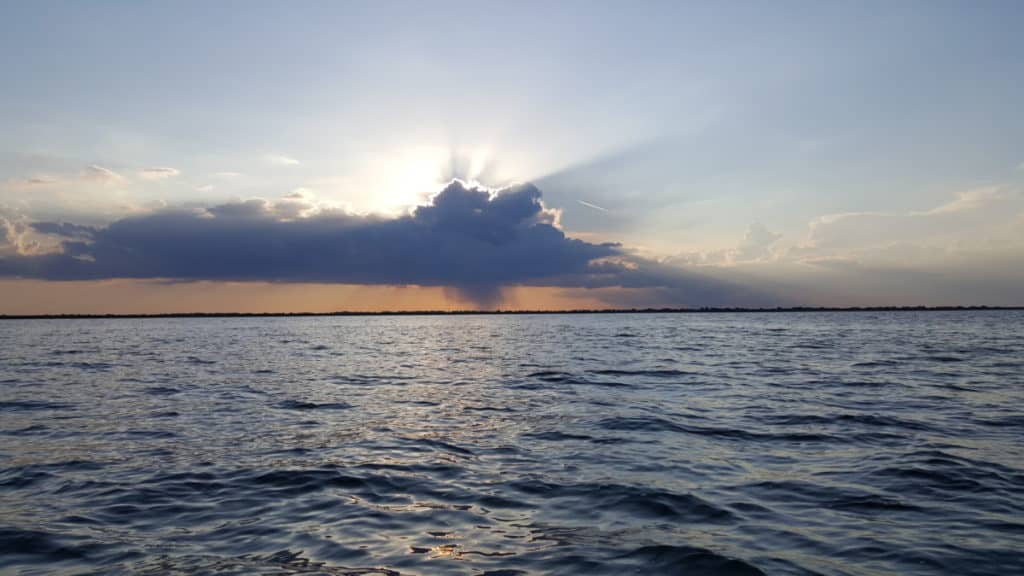
Rain, rain, go away … not so fast. Although rain can certainly be a nuisance and uncomfortable, the bass don’t always seem to mind. In fact, if you approach rainy weather with the right tactics, you may find that bass fishing in the rain can produce fish in significant numbers.
Bass bite when it’s raining. Rain brings extra food into the system and helps to oxygenate the water to make bass active so moving baits like spinnerbaits, walking baits, and chatterbaits work well to get bass to bite when it’s raining. Just after the rain, slower topwater lures are highly effective.
Why is it Good to Fish for Bass in the Rain?
- Rain can cool off warm water in hot summer months and warm up cold water in colder months. In other words, it can stabilize the localized areas of the lake where runoff occurs.
- Raindrops can naturally “aerate” water providing a more oxygen-rich environment for bass.
- Clouds and overcast conditions mean that bass move out of thick cover and roam more, looking to feed.
- Bugs, critters, and other nutrients get flushed into the system via rainwater runoff into the lake.
- Fishing pressure decreases as pleasure boaters and most fishermen leave the lake to seek shelter (and you should, too, if there is any sign of lightning).
- Air pressure is generally lower before and during rain meaning bass become more active.
Are Bass active after rain?
Bass are MORE active after rain if overcast conditions persist, which keeps bass out and away from cover and actively feeding. Conversely, if the rain is associated with a cold front or it becomes very sunny, bass will be LESS active after rain.
After the rain, if low light levels continue, bass act very much like they do in early morning or dusk conditions. They tend to move out of their high-sun hideouts and reposition to more open water settings where they actively feed. Take advantage of this situation and the larger strike zone of bass by using moving baits to cover more water.
If the sun comes back in full force after rain or if the rain is related to a cold front, fishing is usually tougher with a slower bite.
Just before the rain, air pressure typically drops. After rainstorms, barometric pressure usually rises. Take advantage of the chance to catch bass in significant numbers in the period of lower relative pressure before high-pressure post-rain settles in.
I’ve seen this phenomenon happen many times while fishing. Once, while at the St. Johns River for a large tournament, we had fished for hours with barely a bite.
We noticed clouds rolling in and overcast conditions setting in. We expected rain soon. The bite turned on almost immediately after the cloud cover blocked the sun for more than a few minutes. The temperament of the fish changed instantly. We changed from our high-sun, slow-moving soft plastics to moving baits (swimjigs and toads) and began filling out our limit and more.
So, if you’re wondering if bass fishing is good after it rains, grab a rod and go because it can be GREAT!
Does Rain Affect Bass Fishing
Rain can profoundly affect bass fishing. Bass are known to embark on a feeding frenzy just before a good shower because of the relatively low pressure and change in light conditions. Likewise, the bite may slow after rain if the weather is associated with a cold front or other high-pressure situations.
The Top 9 Lures For Bass Fishing in the Rain
1. Topwater Lures Work Well in Light Rain
When the rain is light to moderate, I throw topwater lures like poppers and prop baits. Bass are out and about eating, so topwaters are perfect for getting their attention.
2. Buzzbaits for Active Bass While Raining
Bass can come to the table with voracious appetites when the clouds get thick, and the rain begins to fall. When it’s really coming down, you’ll need something loud enough to get the attention of bass. Buzzbaits are one of my favorites for fishing for bass in some of the nastiest weather, especially in moderately dense vegetation.
3. Whopper Plopper for a Louder Presentation During the Rain
For more sparse settings with fewer weeds, try a treble hook bait like a whopper plopper. If you’ve never tied one on, do it soon. These baits are bass-catching machines. They are loud and cause quite a commotion in the water, which seems to drive bass wild.
4. Swim Jig for Bass in Thicker Vegetation While Raining
Try throwing a swim jig in rainy weather for a less intrusive approach that works great in thicker, more dense vegetation. Swim jigs fished just below the water’s surface create a waking effect that triggers bass’ curiosity in big ways.
5. Spinnerbaits Work Well For Inclement Weather
You’ll probably hear spinnerbaits mentioned in more conversations about what fishing lures to use for bass in the rain than any other lure or bait. Spinnerbaits work well because they include blades that vibrate and spin as they are reeled in.
The water displacement created by the blades, along with their vibration, can make spinnerbaits bass magnets like no other.
6. Vibrating Jigs for Bass During Harder Downpours
For more extreme rainy weather conditions that might require even more underwater commotion, vibrating jigs, also known as chatterbaits, may be in order. They work similarly to spinnerbaits but are a step up in subsurface vibrations.
7. Walking Baits for Bass on Deep Water Structure
Walking baits worked over deep water structure can be used to “call up” bass from their deepwater hideouts. They are a great way to cover water quickly in search of groups of bass that become active during the rain on offshore points, ledges, and more.
8. Toads for Bass in Sparse Cover During Lighter Rain
If you’re looking to fish in more dense cover, try a soft plastic toad buzzed across the top of the water. I would only recommend using a toad during lighter rain situations because it does not create as much commotion as some of the other lures and baits mentioned. This is one of my absolute favorite ways to catch bass when it’s raining.
9. Wake Baits for Bass Roaming During the Rain
Again, bass usually move away from cover and into more open water during inclement weather. If you’re looking to cover water, especially shallow habitats, use a wake bait to work large areas in search of bass roaming to feed. Bass can hardly resist life-like wake baits, which resemble an injured baitfish, an easy meal for bass on the move.
Insider Tip
Light penetration is the first factor to consider when trying to choose lure and bait colors. If the rain is heavy enough to muddy up the water, less light can get through to waiting bass, so contrast (dark colors) becomes important.
More natural colors like motor oil or green pumpkin make sense if the rain is not as heavy and light can still penetrate water.
5 Techniques That Work for Catching Bass in the Rain
1. Move Quickly to Cover Water to Catch Bass When It’s Raining
Bass like to stick to cover when the sun is out or in partly cloudy, rainy conditions. However, when rain clouds roll in, and the drops begin to fall, fish will move out into the open more, becoming more active. Cover water quickly to find where they have grouped up in search of bait.
2. Use Moving Baits to Catch Bass in the Rain
Bass feed more when skies darken. Use their increased aggression to your advantage by tying on a moving bait. Slow presentations may still work, but you’ll be more efficient and put more fish in the boat with moving baits.
3. Look for Rainwater Runoff to Find Bass
Find areas of your fishery where rainwater is entering the system. Rainwater runoff causes bait to congregate in search of food and flushes bugs into the system from the shoreline. Find the bait, and you’ll find the bass.
Additionally, when the rains come in the spring, they can cause a warming effect on cold lake water. Find areas where rainwater is flowing into the lake. Those areas may be a few degrees warmer than the rest of the lake.
Likewise, those same rainwater ingress spots can cool off warm water during hot weather, making them great hangouts for bass.
4. Look for Current Created by Rain to Find Bass
An influx of water because of heavy rain can cause or increase currents. Bass love to set up in current so they can ambush baitfish and other prey. Fish current during rainy weather to take advantage of newly created ambush points for bass.
5. Fish Flooded or High Water Areas for Bass During Rain
After large amounts of rain, water levels may rise so much that many high and dry areas may end up underwater. Try fishing flooded banks, timber, and vegetation for bass. Fish often push up to newly created water in search of untapped food sources.
Lake Okeechobee is one of the best places in the world to fish post big rains. Fishing flooded vegetation at the “Big O” can pay off in huge ways.
The Bass Line. Final Word.
While many anglers run from the rain, I suggest you consider sticking around as long as the conditions remain safe. Bass fishing on cloudy, rainy days can be highly productive, especially if you use the right tactics with the right baits and lures.
Bass fishing is, in fact, good in the rain. So grab your rain gear and have fun learning to use the conditions that nature presents to us to your advantage.
Tight lines, everybody!




